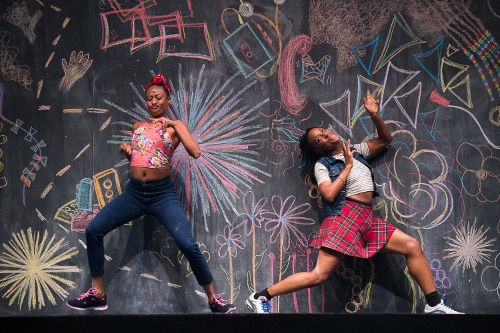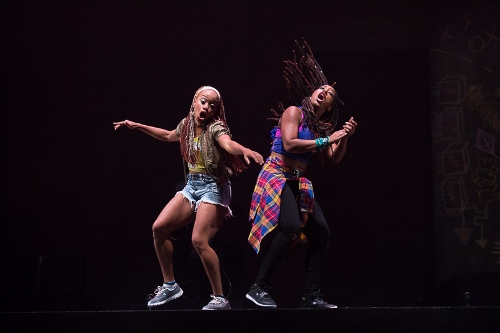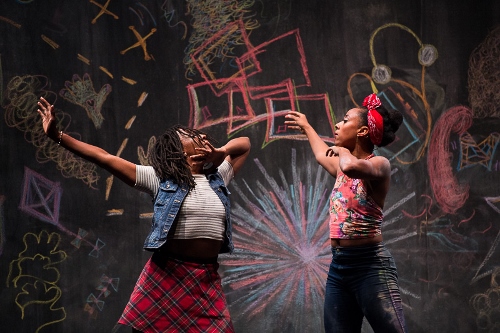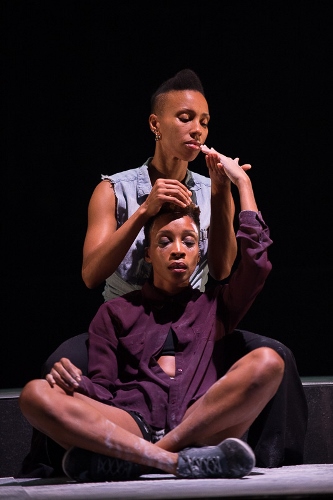|
 |
|
|
 |
 |
The adage “you don't know what you're missing until you find it” could describe the early stages of choreographer Camille A. Brown’s creative process in developing her latest work BLACK GIRL: Linguistic Play. Commissioned by DANCECleveland through a 2014 Joyce Award from the Joyce Foundation, Brown says she had the idea to make a work about black women. And like many choreographers that initial jumping off point led to something more. Through conversations with women at The Northeast Reintegration Center in Cleveland, Ohio, and with other Black women over the past 16-months or so, Brown discovered her own story as a black female, focusing on what she says she was not necessarily hearing from the black women she talked to and from the media ?"€ the story of Black female childhood; its joys as well as its heartaches. Directed and choreographed by Brown in conjunction with her New York–based Camille A. Brown & Dancers, the hourlong BLACK GIRL: Linguistic Play set to live original music by Scott Paterson and Tracy Wormworth along with nursery rhyme melodies and presented by DANCECleveland, will be performed by Brown and company this Saturday, November 14 at Playhouse Square’s Hanna Theatre. Says Brown, it “celebrates the unspoken rhythm and language that Black girls have through Double Dutch, social dances, and hand-clapping games such as 'Miss Suzie had a Steamboat' and 'Miss Mary Mack' that are contemporary and ancestral." “We are not conditioned to think of social dances as anything more than something we do at a party or social,” says Brown by phone from her New York City home. “These were actually steps that provided, and still provide, people with the opportunity to express how they are feeling, to heal, to protest, and that is what I wanted to do with the piece.” Brown, 35, a former dancer with Ronald K. Brown/Evidence, has recently become a choreographer of prominence. In the past known more for her adroit skills as a dancer, Brown as a dancemaker has created works for Alvin Ailey American Dance Theater, Philadanco, Complexions, Urban Bush Women, Ballet Memphis and Hubbard Street II as well as for her own decade old company. Honors include: a 2015 Doris Duke Artist Award Recipient, a 2014 Bessie Award for her production Mr. TOL E. RAncE, two Princess Grace Awards and twice recipient of New England Foundation for the Arts grants. Unlike past works, Brown says she has felt more of a level of expectation from others in the creation of BLACK GIRL: Linguistic Play. Because she visited with women at The Northeast Reintegration Center, some expected the work to be about them or when she showcased a portion of the work this past January in Cleveland as part of the International Association of Blacks in Dance’s 27th Annual Conference and Festival, some expected the movement language shown then to carry throughout the entire piece. “People sometimes create the story for you unconsciously in their minds, so when you show it they say ‘that says that is not what I was expecting,’” says Brown. “It is about the women I talked to in Cleveland; it is also about black women, black girls, all over. It is not about talking their stories and creating a work I don’t know. It’s taking their stories and my stories and putting them all together through my eyes in a way that is universal.” Brown also took inspiration from literature in developing BLACK GIRL: Linguistic Play’s themes including Lewis Carroll's “Alice's Adventures in Wonderland,” Melissa V. Harris-Perry's “Sister Citizen: Shame, Stereotypes, and Black Women in America” and others. In addition, she enlisted the aid of dramaturges Daniel Banks, Kamilah Forbes and Talvin Wilks to help flesh out the piece. Whatever its inspirations, BLACK GIRL: Linguistic Play is ultimately Brown's personal journey as a Black female. “What was rewarding for me about this work was doing something I knew was a risk,” says Brown. “You are taking things that people may consider trivial and not art and claiming it as art. You are doing it for you. Not to present or teach, just be. I want black girls, black women and everyone to connect to this piece. Part of DANCECleveland's 60th Anniversary Season, Camille A. Brown & Dancers perform BLACK GIRL: Linguistic Play, 8 p.m., Saturday, November 14. Playhouse Square’s Hanna Theatre, 2067 E 14th Street, Cleveland. $15-35. DANCECleveland.org or (216) 241-6000.
 Dancers Fana Fraser and Beatrice Capote in "BLACK GIRL: Linguistic Play." Photo © & courtesy of Christopher Duggan |
|
 Dancers Camille A. Brown and Catherine Foster in "BLACK GIRL: Linguistic Play." Photo © & courtesy of Christopher Duggan |
|
 Dancers Fana Fraser and Beatrice Capote in "BLACK GIRL: Linguistic Play." Photo © & courtesy of Christopher Duggan |
|
 Dancers Mora-Amina Parker and Yusha-Marie Sorzano in "BLACK GIRL: Linguistic Play." Photo © & courtesy of Christopher Duggan |
|
|
|





